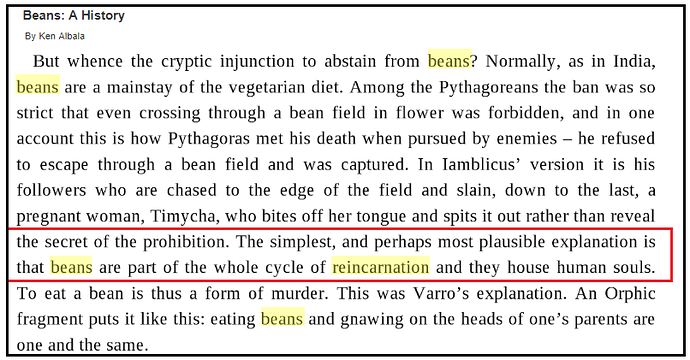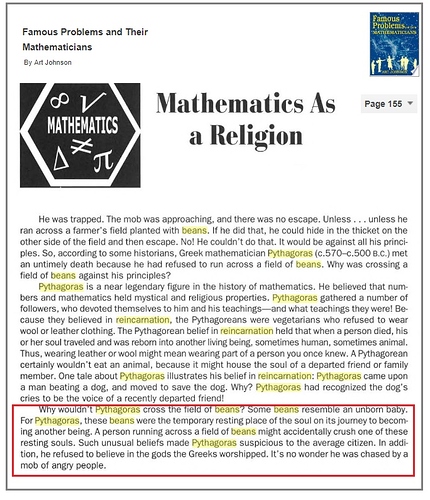This is a companion discussion topic for the original entry at https://biologos.org/blogs/guest/isnt-the-resurrection-just-a-relic-of-a-primitive-pre-scientific-worldview
This is a companion discussion topic for the original entry at https://biologos.org/blogs/guest/isnt-the-resurrection-just-a-relic-of-a-primitive-pre-scientific-worldview
As we know, the New Testament has many references to the (mistaken) belief that Jesus was the reincarnation of some earlier prophet… or maybe even the recently deceased John the Baptist!
For some, the whole notion that the Jewish believers of that time would frequently ask about reincarnation seems rather out of place.
But the Middle East was a land of many “Fathers”. And one of the Fathers of the region was the Persian Empire. Within the Persian Empire, there was apparently quite a bit of admixture created by missionaries out of the Indic/Hindu territories. The Vedic notions of reincarnation were well enough known in Persia that Pythagoras himself was influenced by these Eastern notions.
Many students of Greek civilization will recall the vaguely disturbing references to Pythagoras avoiding trampling of a bean field…
Vegetarianism
Some authors mentioned a “Pythagorean diet”, the abstention from eating meat, beans, or fish. Firenze debated the Pythagorean diet in 1743.[22]
Some stories of Pythagoras’ murder revolve around his aversion to beans. According to legend, enemies of the Pythagoreans set fire to Pythagoras’ house, sending the elderly man running toward a bean field, where he halted, declaring that he would rather die than enter the field – whereupon his pursuers slit his throat.[23] It has been suggested that the prohibition of beans was to avoid favism; susceptible people may develop hemolytic anemia as a result of eating beans, or even of walking through a field where bean plants are in flower.[24] It is more likely to have been for magico-religious reasons,[25] perhaps because beans obviously demonstrate the potential for life, perhaps because they resemble the kidneys and genitalia.[26] There was a belief that beans and human beings were created from the same material.[27]
According to accounts from Diogenes Laertius, and or Eustathius, it is thought that the fava bean was particularly sacred to the Pythagoreans; this is because fava beans have hollow stems, and it was believed that souls of the deceased would travel through the ground, up the hollow stems, into the beans where they would reside.[28]
Callimachus is quoted: “Keep your hands from beans, a painful food: As Pythagoras enjoined, I too urge”. Additionally, Empedocles is quoted: “Wretches, utter wretches, keep your hands from beans”.[29]
.
.
.
This wiki article almost gets it right:
The reason you couldn’t even walk through a bean field has to do with the last reference above:
"According to accounts from Diogenes Laertius, and or Eustathius, it is thought that the fava bean was particularly sacred to the Pythagoreans; this is because fava beans have hollow stems, and it was believed that souls of the deceased would travel through the ground, up the hollow stems, into the beans where they would reside.[fn 28 See Cicero, On Divination, I xxx 62. [and] Barnes, Jonathan, Early Greek Philosophy, 2nd ed., London: Oxford, 2001. pp. 165–66. ]**
Based on the similarity in beliefs, Jainism had meandered all the way through Persia to the Greek islands, eventually to Pythagoras, where he seems to have endorsed the major elements. But maybe with the rigor of Western philosophers not expected in India? After all, Indians ate beans. But maybe the Jains did not? I’ll be looking into that. I’ve read that Pythagoras traveled into Persia … but I’ve never traced that line of inquiry down enough to have confidence in the rumor.
.
.
.
It was not just that human souls would travel [ up from the underworld! ] through those hollow stems…to permanently reside in beans . . . but that these fields is where reincarnated souls were temporarily arranged until the fates or some divine force deployed them to a new living being (human or otherwise)!
Do I digress?!
The point I’m trying to make is that if reincarnation, via the Persian connections with the Greeks, could make it all the way to the Greek Pythagoras, who took his ideas to Italy in the 500’s BCE… then it should not be surprising that similar ideas (without the bean taboo!) could make it just to the Levant in time for the birth of Jesus!
I find that important theological questions such as this one are often profitably considered from the Bayesian probabilistic view. That is, viewing belief as a confidence/probability of truth. Thus, giving a simple ‘true/false’ answer is replaced by a more nuanced one where one states what they would assess the probability of the resurrection having actually occurred. A ‘50 percent’ answer would mean it is equally likely to have or have not taken place, while ‘100 percent’ would indicate complete confidence in its happening. This method has been used by others, for example, in determining the probability of God existing (a book title, in fact).
This view has a number of advantages, allowing one to use Bayes Theorem to assess how the confidence probability changes as new evidence occurs. For instance, the inclusion of personal experiences with the divine can be incorporated with this model.
Likewise, the removal of one of the evidential factors mentioned by the invited posts would allow one to formally reassess the probability and, in a sense, do an evidential sensitivity analysis. This is actually important as, despite the absence of any specific references by the invited authors, most of us are aware of cogent objections raised by skeptics. These include the ‘Passover conspiracy’ of several generations ago, and James Tabor’s ossuary claims in more recent times.
One need not, in fact, do any math at all. Just ask what is your personal confidence in the truth of the resurrection? Based on the Biblical evidence alone, I would personally say it was around 70% for me. When I then also consider my own personal life experiences, this is raised to 90%. Note this is not an objective truth value, just my belief. Try it yourself.
Personal note: I view myself as a liberal evangelical, bible church attending, Christian. Background: Engineering PhD, UCLA, Howard Hughes Doctoral Fellow.
The main point of the article seems to be that people can determine that a specific person is dead or that a person is alive despite lacking knowledge of modern science. I’d assume this is generally the case, especially when one has the body to thoroughly examine. So I wonder why that sort of statement would be necessary. I mean, did pre-scientific cultures routinely bury live people because they mistakenly thought the people were dead? You hear stories, even from the Victorian age, but those tend to be the exceptions.
That’s the reading I got of the particular article as well. Since it would have been perfectly obvious to anybody who was there whether or not Jesus rose from the dead or not (though there wasn’t a body for most to examine according to the Gospel accounts-it was dependent on Jesus appearing selectively to various people), the argument then is that he did rise from the dead because the Bible would not say that he did if he didn’t.
It seems a bit circular to me in that “the resurrection is true because the Bible says the resurrection is true because if it wasn’t, the Bible would have said the resurrection isn’t true.”
This topic was automatically closed 6 days after the last reply. New replies are no longer allowed.

